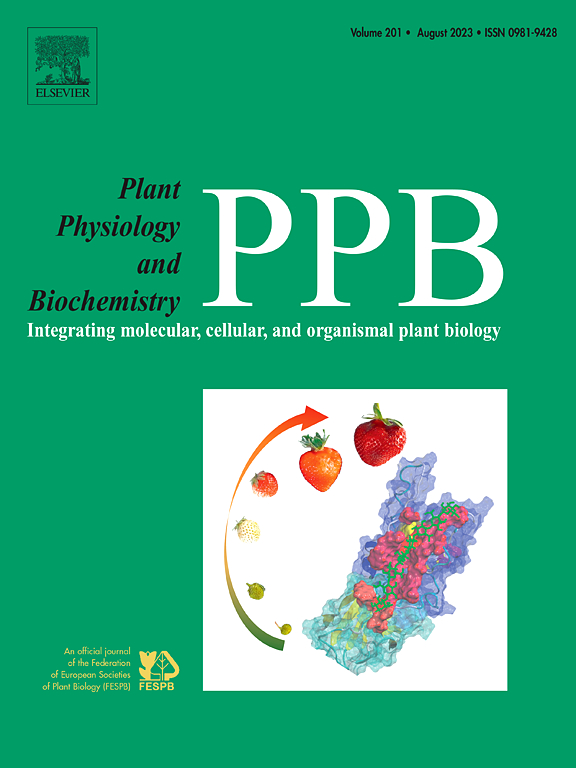Effect of AM fungi on the growth and powdery mildew development of Astragalus sinicus L. under water stress
IF 5.7
2区 生物学
Q1 PLANT SCIENCES
引用次数: 0
Abstract
Arbuscular mycorrhizal (AM) fungi are widely existing soil microorganisms that form symbiotic relationships with most terrestrial plants. They are important for enhancing adversity resistance, including resistance to disease and water stresses. Nevertheless, it is not clear whether the benefits can be maintained in regulating the occurrence of plant diseases under drought, flooding stress and during water restoration. In this study, we investigated the effect of AM fungus (Glomus versiforme) on the development of powdery mildew in Chinese milk vetch (Astragalus sinicus) under drought, flooding, and water recovery. The results showed that AM fungal symbiosis promoted the growth of Chinese milk vetch under water stress conditions. It increased the accumulation of ethylene (ET) and jasmonic acid (JA), enhanced the activities of antioxidant enzymes, and decreased the accumulation of salicylic acid (SA) and abscisic acid (ABA). The differentially expressed genes (DEGs) obtained from transcriptome sequencing under each stress were subjected to weighted gene co-expression network analysis (WGCNA), and a total of 12 gene co-expression modules were obtained. The analysis of the relationship between the co-expressed genes in the 12 modules and plant physiological traits showed that the magent, grey60 and darkturquoise modules were significantly associated with ET, SA, JA, ABA, plant defence enzyme activities, malondialdehyde (MDA) and H2O2 content. Water stress and disease were related with the up-regulated expression of genes in the flavonoid biosynthesis and oxidative phosphorylation, plant hormone signal transduction and plant-pathogen interaction pathways. Importantly, inoculation with AM fungus reduced the incidence of powdery mildew under drought stress by 16.54%. In summary, the results of this study showed that inoculation with AM had a positive effect on powdery mildew development tolerance in Chinese milk vetch under drought and flooding stresses and stress recovery. This provides a good basis for field management and sustainable growth of green manure crop Chinese milk vetch.

水分胁迫下AM真菌对黄芪生长及白粉病发育的影响。
丛枝菌根真菌(AM)是广泛存在的土壤微生物,与大多数陆生植物形成共生关系。它们对增强抗逆性很重要,包括对疾病和水分胁迫的抵抗力。然而,目前尚不清楚在干旱、洪涝胁迫和水分恢复过程中是否能保持这种益处来调节植物病害的发生。本研究研究了AM真菌(Glomus versiformme)在干旱、洪涝和水分恢复条件下对黄芪(Astragalus sinicus)白粉病发生的影响。结果表明,AM真菌共生对水分胁迫条件下紫云英的生长有促进作用。增加了乙烯(ET)和茉莉酸(JA)的积累,增强了抗氧化酶的活性,降低了水杨酸(SA)和脱落酸(ABA)的积累。对各胁迫下转录组测序得到的差异表达基因(deg)进行加权基因共表达网络分析(WGCNA),共得到12个基因共表达模块。对12个模块共表达基因与植物生理性状的关系分析表明,管理模块、灰60模块和暗绿松石模块与ET、SA、JA、ABA、植物防御酶活性、丙二醛(MDA)和H2O2含量显著相关。水分胁迫与病害的发生与黄酮类生物合成和氧化磷酸化、植物激素信号转导和植物-病原体互作通路基因表达上调有关。重要的是,接种AM真菌可使干旱胁迫下的白粉病发病率降低16.54%。综上所述,本研究结果表明,接种AM对豇豆在旱涝胁迫下的白粉病发育耐受性和胁迫恢复有积极影响。这为绿肥作物紫薇的田间管理和可持续生长提供了良好的依据。
本文章由计算机程序翻译,如有差异,请以英文原文为准。
求助全文
约1分钟内获得全文
求助全文
来源期刊
CiteScore
11.10
自引率
3.10%
发文量
410
审稿时长
33 days
期刊介绍:
Plant Physiology and Biochemistry publishes original theoretical, experimental and technical contributions in the various fields of plant physiology (biochemistry, physiology, structure, genetics, plant-microbe interactions, etc.) at diverse levels of integration (molecular, subcellular, cellular, organ, whole plant, environmental). Opinions expressed in the journal are the sole responsibility of the authors and publication does not imply the editors'' agreement.
Manuscripts describing molecular-genetic and/or gene expression data that are not integrated with biochemical analysis and/or actual measurements of plant physiological processes are not suitable for PPB. Also "Omics" studies (transcriptomics, proteomics, metabolomics, etc.) reporting descriptive analysis without an element of functional validation assays, will not be considered. Similarly, applied agronomic or phytochemical studies that generate no new, fundamental insights in plant physiological and/or biochemical processes are not suitable for publication in PPB.
Plant Physiology and Biochemistry publishes several types of articles: Reviews, Papers and Short Papers. Articles for Reviews are either invited by the editor or proposed by the authors for the editor''s prior agreement. Reviews should not exceed 40 typewritten pages and Short Papers no more than approximately 8 typewritten pages. The fundamental character of Plant Physiology and Biochemistry remains that of a journal for original results.

 求助内容:
求助内容: 应助结果提醒方式:
应助结果提醒方式:


